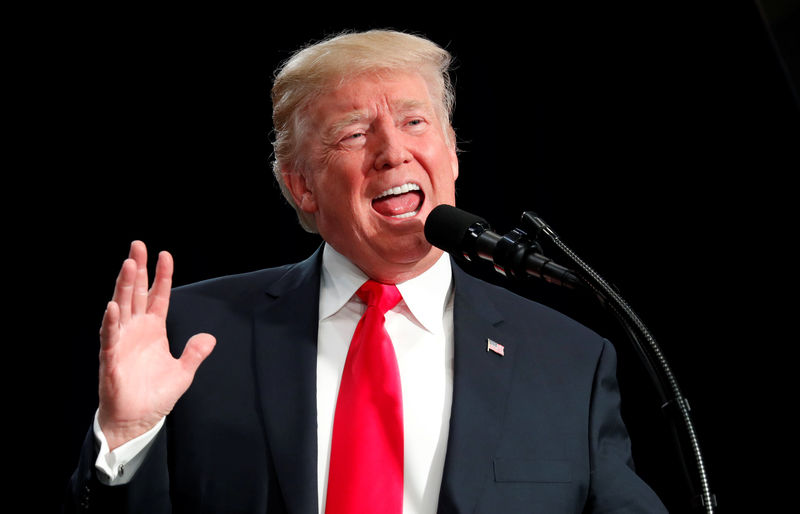By Jeff Mason
WASHINGTON (Reuters) - The White House is confident it can craft a deal to avoid a government shutdown and foresees a compromise with lawmakers that will include increases in defense and non-defense spending, White House legislative affairs director Marc Short said on Thursday.
In an interview with Reuters, Short also said Trump wanted a corporate tax rate of 20 percent in the tax cut package being debated in Congress despite the president saying recently that it could end up higher.
Trump held a meeting with Democratic and Republican leaders of Congress on Thursday to work on bridging differences over the U.S. budget and avoid a stop in government services.
"We have been willing to go along with additional spending on the non-defense side," Short said of a potential compromise deal on government spending.
"I'm hopeful that ... we find a pathway to get a two-year budget cap deal" that enables budget writers to put together a bill for fiscal year 2018 with boundaries for fiscal year 2019 as well, he said.
Short said the White House stood firmly behind the goal of a 20-percent corporate tax rate as part of the planned tax overhaul currently in Congress.
Trump's recent reference to a possible 22-percent corporate tax rate was only a product of conversations he had had with lawmakers, Short said.
"I think he was just reflecting what conversations he had heard from them, but that ... wasn't intended to signal: this is an endorsement of raising the corporate rate," he said.
"When you're seeing countries like Great Britain go below 20, you're seeing Ireland at 12 percent, potentially going to single digits, 20 percent is about as high as we feel comfortable going."
Short said he expected Congress to approve the Republicans' tax effort this year, though Trump may not sign it until 2018.
He said the White House supported a deal agreed with Senator Susan Collins that would restore billions of dollars of subsidy payments, called cost-sharing reductions, or CSRs, to health insurers, in exchange for her support for the tax bill.
"The reduction of corporate tax rates, the delivery of tax rates for middle income families, the simplification of the tax code for the price of CSR payments was a transaction we were willing to make with Susan Collins," he said.
CONFIDENT OF NO SHUTDOWN
Short said the president was eager to find a legislative solution for immigrants who were brought to the United States illegally as children and previously received protection under the Deferred Action for Child Arrivals (DACA) program.
"He is anxious to solve that problem, but doesn't feel like the funding of our military and the funding of our government should be held hostage by that," Short said.
Democrats have made a solution for DACA a key priority, but House of Representatives Democratic leader Nancy Pelosi said on Thursday they would not shut the government over the issue.
Short said he was confident that a shutdown would be avoided.
"Not just markets, but Americans shouldn't worry about it. We're going to make sure that government stays open and funded. That's a priority," he said.
Short said the administration planned to outline its priorities for welfare reform next year. That, along with an infrastructure bill, would be top legislative priorities in 2018, though their timing would depend on the congressional calendar, he said.
Short also said the White House would support legislation that lays out how to address sexual misconduct by lawmakers.
"The White House is supportive, but also I think that we recognize the ability of Congress to self-regulate," he said.
Short, who is the top interlocutor between the White House and Congress and has become a frequent guest on television to explain Trump's policies, suggested he was staying put despite a recent report saying he could leave the administration.

"I have no plans to go anywhere," he said.